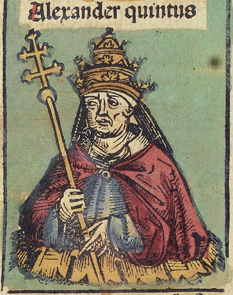Antipope Alexander V facts for kids
Quick facts for kids Antipope Alexander V |
|
|---|---|

Miniature of Alexander V in the Nuremberg Chronicle, 1493
|
|
| Papacy began | 26 June 1409 |
| Papacy ended | 3 May 1410 |
| Predecessor | Gregory XII |
| Successor | John XXIII |
| Opposed to |
|
| Personal details | |
| Birth name | Petros Philargos |
| Born | c. 1339 Neapoli, Crete, Republic of Venice |
| Died | 3 May 1410 (aged 70–71) Bologna, Papal States |
| Nationality | Greek |
| Denomination | Catholic |
| Coat of arms |  |
| Other Popes and Antipopes named Alexander | |
Peter of Candia, also known as Alexander V, was a religious leader elected during a confusing time in the Catholic Church called the Western Schism. This was a period (1378–1417) when more than one person claimed to be the true Pope.
Alexander V was chosen by a group of cardinals at the Council of Pisa in 1409. He was called an "antipope" because the Catholic Church later decided he was not the true pope. He was in power for a short time, from June 1409 until his death in 1410. During this time, there were actually three people claiming to be pope: Alexander V, Gregory XII (the Roman pope), and Benedict XIII (the Avignon pope).
Contents
Early Life and Studies
Peter was born around 1339 in Crete, which was then part of the Republic of Venice. He was born into a Greek family and his birth name was Pietro Filargo. He is also known as Peter of Candia.
When he was young, Peter became an orphan. Italian Franciscans (a group of Catholic religious followers) took care of him. He joined the Franciscan order and was very smart. Because of his abilities, he was sent to study at famous universities like Oxford in England and the University of Paris in France.
Rise in the Church
While Peter was studying in Paris, the Western Schism began. This was when the Church split, with different leaders claiming to be the rightful pope. Peter supported Pope Urban VI, one of the popes during this time.
Later, Peter became an important adviser to Giangaleazzo Visconti, who was the Duke of Milan. For nearly ten years, Peter worked as a prime minister for the Duke and his son. He then returned to Italy. With the Duke's help, Peter became a bishop in several cities: Piacenza (1386), Vicenza (1387), and Novara (1389). He then became the Archbishop of Milan in 1402. In 1405, Pope Innocent VII made him a cardinal.
Becoming an Antipope
In 1409, a meeting called the Council of Pisa took place. Cardinals gathered there to try and end the Western Schism. They decided that both the Roman pope and the Avignon pope should step down. The cardinals then elected Peter of Candia as the new pope.
He was crowned on June 26, 1409, and took the name Alexander V. This meant there were now three people claiming to be pope at the same time! Most countries in Europe recognized Alexander V as the true pope. However, some places, like the Kingdom of Aragon and Scotland, stayed loyal to the Avignon pope. Some Italian states still supported the Roman pope.
During his short time as pope, Alexander V wanted to gain more support across Europe. He also promised some reforms, like giving more power back to local churches to choose their leaders. He was very generous with favors, especially to religious groups that relied on charity.
Alexander V died suddenly in Bologna on May 3, 1410. He was with Cardinal Baldassare Cossa at the time. His body was buried in the church of St. Francis in Bologna. A rumor spread that he had been poisoned by Cossa, who then became the next antipope, John XXIII. However, this rumor is now believed to be false.
Legacy and Recognition
For a long time, the Catholic Church considered Gregory XII's time as pope to have ended in 1409 when Alexander V was elected. However, in 1958, when a new pope chose the name Pope John XXIII, he said that there had been "twenty-two Johns of indisputable legitimacy." This meant that the previous John XXIII, who had followed Alexander V, was not considered a true pope.
Because of this, Alexander V is now officially seen by the Catholic Church as an "antipope." The Church now recognizes Gregory XII's papacy as continuing until 1415. Even though Alexander V is an antipope, his name "Alexander V" is still used in the numbering sequence. This is because another pope, Rodrigo Borgia, had already taken the name Alexander VI in 1492.
See also
 In Spanish: Alejandro V (antipapa) para niños
In Spanish: Alejandro V (antipapa) para niños
- Papal selection before 1059
- Papal conclave (since 1274)
 | Delilah Pierce |
 | Gordon Parks |
 | Augusta Savage |
 | Charles Ethan Porter |

